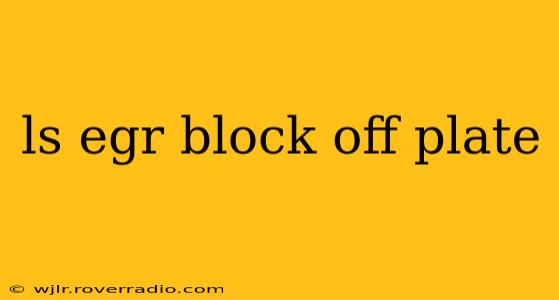An EGR (Exhaust Gas Recirculation) block off plate is a simple yet effective modification that prevents exhaust gases from being recirculated back into the engine's intake. This modification is popular among vehicle owners for several reasons, but it's crucial to understand both the benefits and potential drawbacks before undertaking such a project. This comprehensive guide will address common questions and concerns surrounding EGR block off plates.
What is an EGR Block Off Plate?
An EGR block off plate is a metal plate designed to replace the EGR valve or a section of the EGR system's piping. Its primary function is to completely stop the flow of exhaust gases back into the engine's intake manifold. This is achieved by physically blocking the pathway the gases would normally take. The plate is usually made from durable materials like aluminum or steel, designed to withstand the heat and pressure within the exhaust system.
Why Use an EGR Block Off Plate?
Many vehicle owners choose to install an EGR block off plate for various reasons:
-
Improved Engine Performance: By eliminating the recirculation of exhaust gases, which can dilute the air-fuel mixture and reduce combustion efficiency, some drivers report a noticeable increase in horsepower and torque. This is particularly true in older vehicles where the EGR system may be less efficient or prone to malfunction.
-
Reduced Carbon Buildup: Exhaust gases contain soot and other particulate matter. Recirculating these gases can lead to significant carbon buildup on engine valves and other components. Blocking the EGR system can reduce this buildup, potentially extending engine life and improving overall performance.
-
Resolution of EGR System Issues: A malfunctioning EGR valve can trigger a check engine light, leading to poor fuel economy and potentially damaging the engine. In some cases, an EGR block off plate can be a cost-effective solution to resolve persistent EGR-related problems, especially if the cost of replacing or repairing the EGR valve is high.
What are the potential problems with installing an EGR Block Off Plate?
While blocking the EGR system offers several advantages, it's crucial to be aware of potential drawbacks:
-
Increased Emissions: Blocking the EGR system will undoubtedly increase emissions of nitrogen oxides (NOx), which are harmful pollutants. This modification might cause your vehicle to fail an emissions test, depending on your local regulations.
-
Check Engine Light: The vehicle's onboard diagnostics (OBD) system will likely detect the absence of EGR function and illuminate the check engine light. This can be resolved with a tune or an EGR delete code, but this will vary on the make and model of the vehicle.
-
Potential for Increased Engine Wear: The increased combustion temperatures resulting from blocking the EGR system can increase the risk of engine wear and damage in some vehicles, particularly under heavy loads or extreme conditions.
How do I install an EGR block off plate?
The installation process varies greatly depending on the vehicle's make, model, and year. It typically involves removing the EGR valve or a portion of the EGR piping, cleaning the surfaces, and securely bolting the block off plate in place. This is generally considered a moderately challenging DIY project and may require specialized tools and some mechanical aptitude. Always consult a repair manual specific to your vehicle before attempting installation.
Does an EGR block off plate void my warranty?
Modifying your vehicle's emissions system almost always voids any remaining factory warranty on emission related components. Check your vehicle's warranty terms and conditions to be absolutely sure.
Is an EGR Block Off Plate Legal?
The legality of installing an EGR block off plate varies significantly by region and jurisdiction. Many areas have strict emissions regulations, and using an EGR block off plate could result in fines or other penalties if detected during vehicle inspections. Always check your local laws and regulations before making any modifications to your vehicle's emissions system.
What are the alternatives to using an EGR block off plate?
Depending on the nature of the problem, alternatives to an EGR block off plate might include repairing or replacing the EGR valve, cleaning the EGR system, or even a professional tune to manage the EGR operation more effectively.
This article provides a comprehensive overview of EGR block off plates. Remember to always consult a qualified mechanic and refer to your vehicle’s repair manual before undertaking any modifications. Understanding the potential benefits, drawbacks, and legal implications is crucial to making an informed decision.
